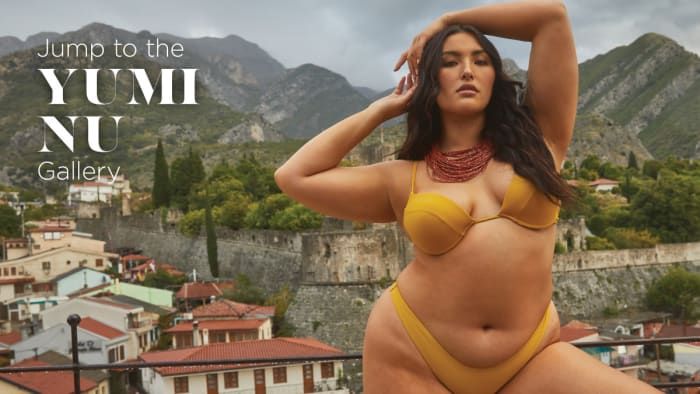Yumi Nu’s Year of Visibility
Let me be the first to tell you that my modeling career got off to a much rockier start than you might guess. Sure, my first few jobs were for household names like Lands’ End and Mercedes-Benz. But I got pulled from those gigs pretty quickly after my handlers discovered I was throwing screaming fits and falling asleep on set. To be clear, my “handlers” in this situation were my parents, and I was a newborn baby.
You can view the 2022 photo shoot for Yumi Nu here.
Jokes aside, modeling was my first job, but it wasn’t my first ambition. When I was 7, I decided I wanted to be a singer. That didn’t surprise anyone, since I come from a show-business family: My mom, aunt and grandma were models themselves, and my uncle is DJ Steve Aoki.
After I’d been taking voice lessons for a few years, my mom made my sister, Natalie, and me perform a whole repertoire of our favorite Beyoncé songs as a little recital for Uncle Steve. I’m not sure what she expected—for him to immediately hire us as his opening act, or something? (He didn’t, but he did later sign me to his record label. And I finally got onstage with him in 2018.)
I’m 25 now, but in a way you could still say I want to be a singer when I grow up. When I’m not posing on a beach in Montenegro, taking breaks to scurry out of frame into the inviting embrace of a big, warm parka, you can find me writing songs on my laptop in my state-of-the-art home studio (aka the spare room of my place in New York City, which I’ve recently outfitted with some speakers).

Yumi Nu was photographed by James Macari in Montenegro. Swimsuit by 437 Swim .Earrings by Michelle Ross.
I haven’t been getting as much quality time there as usual over the past year, though—I’ve been a little busy. Hands down, this has been the biggest year of my modeling career thus far: After making my SI Swimsuit debut in last year’s issue, I appeared on the cover of the September issue of Vogue; I shot for Victoria’s Secret; I even did a fragrance campaign. And I fulfilled a longtime dream of mine by booking the cover of Vogue Japan. I’m second-generation Japanese American, and Japanese culture values being skinny, dainty and small. So for me to be on the cover of Vogue Japan meant being seen and being honored by a culture that often makes people with bigger bodies like mine feel invisible.
Of course, it’s not just Japan where there’s a premium on being thin. Even here in the U.S., where a lot of the fashion industry has become more inclusive toward people with bodies like mine in the last few years, some people—for example, designers at certain high-fashion houses and dumb, angry guys on the internet, among others—just haven’t quite figured out yet that people who look like me belong everywhere everyone else does. But to them I say: We’ll wait. We’re here, and we’re not going away.

